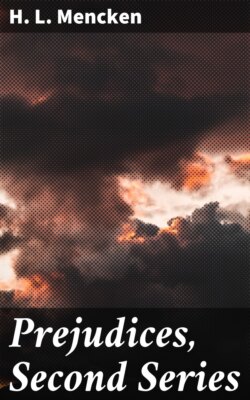Читать книгу Prejudices, Second Series - H. L. Mencken - Страница 4
На сайте Литреса книга снята с продажи.
2 The Answering Fact
ОглавлениеNow for the answering fact. How has the issue replied to these visionaries? It has replied in a way that is manifestly to the discomfiture of Emerson as a prophet, to the dismay of Poe as a pessimist disarmed by transient optimism, and to the utter collapse of Whitman. We have, as every one knows, produced no such "new and greater literatus order" as that announced by old Walt. We have given a gaping world no books that "radiate," and surely none intelligibly comparable to stars and constellations. We have achieved no prodigies of the first class, and very few of the second class, and not many of the third and fourth classes. Our literature, despite several false starts that promised much, is chiefly remarkable, now as always, for its respectable mediocrity. Its typical great man, in our own time, has been Howells, as its typical great man a generation ago was Lowell, and two generations ago, Irving. Viewed largely, its salient character appears as a sort of timorous flaccidity, an amiable hollowness. In bulk it grows more and more formidable, in ease and decorum it makes undoubted progress, and on the side of mere technic, of the bald capacity to write, it shows an ever-widening competence. But when one proceeds from such agencies and externals to the intrinsic substance, to the creative passion within, that substance quickly reveals itself as thin and watery, and that passion fades to something almost puerile. In all that mass of suave and often highly diverting writing there is no visible movement toward a distinguished and singular excellence, a signal national quality, a ripe and stimulating flavor, or, indeed, toward any other describable goal. What one sees is simply a general irresolution, a pervasive superficiality. There is no sober grappling with fundamentals, but only a shy sporting on the surface; there is not even any serious approach, such as Whitman dreamed of, to the special experiences and emergencies of the American people. When one turns to any other national literature—to Russian literature, say, or French, or German or Scandinavian—one is conscious immediately of a definite attitude toward the primary mysteries of existence, the unsolved and ever-fascinating problems at the bottom of human life, and of a definite preoccupation with some of them, and a definite way of translating their challenge into drama. These attitudes and preoccupations raise a literature above mere poetizing and tale-telling; they give it dignity and importance; above all, they give it national character. But it is precisely here that the literature of America, and especially the later literature, is most colorless and inconsequential. As if paralyzed by the national fear of ideas, the democratic distrust of whatever strikes beneath the prevailing platitudes, it evades all resolute and honest dealing with what, after all, must be every healthy literature's elementary materials. One is conscious of no brave and noble earnestness in it, of no generalized passion for intellectual and spiritual adventure, of no organized determination to think things out. What is there is a highly self-conscious and insipid correctness, a bloodless respectability, a submergence of matter in manner—in brief, what is there is the feeble, uninspiring quality of German painting and English music.
It was so in the great days and it is so to-day. There has always been hope and there has always been failure. Even the most optimistic prophets of future glories have been united, at all times, in their discontent with the here and now. "The mind of this country," said Emerson, speaking of what was currently visible in 1837, "is taught to aim at low objects. … There is no work for any but the decorous and the complaisant. … Books are written … by men of talent … who start wrong, who set out from accepted dogmas, not from their own sight of principles." And then, turning to the way out: "The office of the scholar (i.e., of Whitman's 'literatus') is to cheer, to raise and to guide men by showing them facts amid appearances." Whitman himself, a full generation later, found that office still unfilled. "Our fundamental want to-day in the United States," he said, "with closest, amplest reference to present conditions, and to the future, is of a class, and the clear idea of a class, of native authors, literatuses, far different, far higher in grade, than any yet known"—and so on, as I have already quoted him. And finally, to make an end of the prophets, there is Brooks, with nine-tenths of his book given over, not to his prophecy—it is crowded, indeed, into the last few pages—but to a somewhat heavy mourning over the actual scene before him. On the side of letters, the æsthetic side, the side of ideas, we present to the world at large, he says, "the spectacle of a vast, undifferentiated herd of good-humored animals"—Knights of Pythias, Presbyterians, standard model PhD.'s, readers of the Saturday Evening Post, admirers of Richard Harding Davis and O. Henry, devotees of Hamilton Wright Mabie's "white list" of books, members of the Y. M. C. A. or the Drama League, weepers at chautauquas, wearers of badges, 100 per cent, patriots, children of God. Poe I pass over; I shall turn to him again later on. Nor shall I repeat the parrotings of Emerson and Whitman in the jeremiads of their innumerable heirs and assigns. What they all establish is what is already obvious: that American thinking, when it concerns itself with beautiful letters as when it concerns itself with religious dogma or political theory, is extraordinarily timid and superficial—that it evades the genuinely serious problems of life and art as if they were stringently taboo—that the outward virtues it undoubtedly shows are always the virtues, not of profundity, not of courage, not of originality, but merely those of an emasculated and often very trashy dilettantism.
